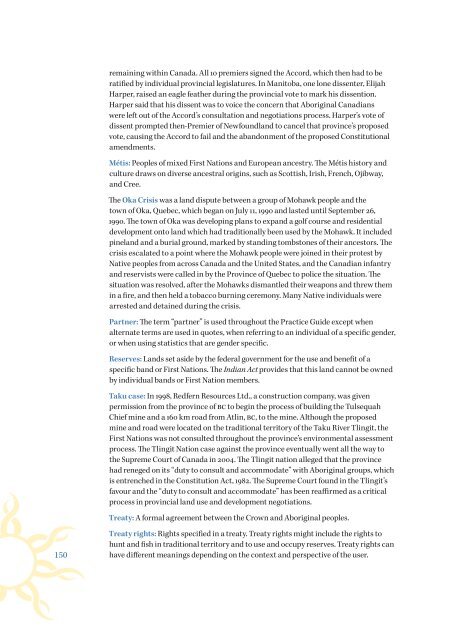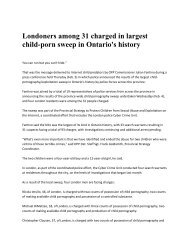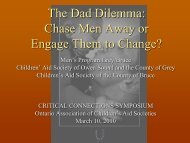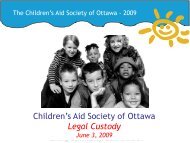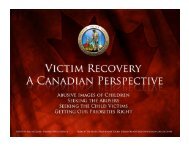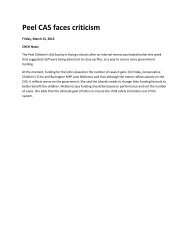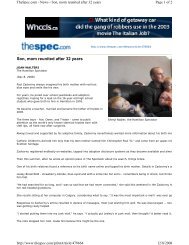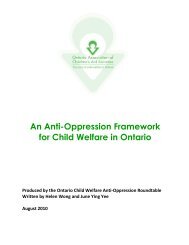English - Ontario Association of Children's Aid Societies
English - Ontario Association of Children's Aid Societies
English - Ontario Association of Children's Aid Societies
Create successful ePaper yourself
Turn your PDF publications into a flip-book with our unique Google optimized e-Paper software.
emaining within Canada. All 10 premiers signed the Accord, which then had to be<br />
ratified by individual provincial legislatures. In Manitoba, one lone dissenter, Elijah<br />
Harper, raised an eagle feather during the provincial vote to mark his dissention.<br />
Harper said that his dissent was to voice the concern that Aboriginal Canadians<br />
were left out <strong>of</strong> the Accord’s consultation and negotiations process. Harper’s vote <strong>of</strong><br />
dissent prompted then-Premier <strong>of</strong> Newfoundland to cancel that province’s proposed<br />
vote, causing the Accord to fail and the abandonment <strong>of</strong> the proposed Constitutional<br />
amendments.<br />
Métis: Peoples <strong>of</strong> mixed First Nations and European ancestry. The Métis history and<br />
culture draws on diverse ancestral origins, such as Scottish, Irish, French, Ojibway,<br />
and Cree.<br />
The Oka Crisis was a land dispute between a group <strong>of</strong> Mohawk people and the<br />
town <strong>of</strong> Oka, Quebec, which began on July 11, 1990 and lasted until September 26,<br />
1990. The town <strong>of</strong> Oka was developing plans to expand a golf course and residential<br />
development onto land which had traditionally been used by the Mohawk. It included<br />
pineland and a burial ground, marked by standing tombstones <strong>of</strong> their ancestors. The<br />
crisis escalated to a point where the Mohawk people were joined in their protest by<br />
Native peoples from across Canada and the United States, and the Canadian infantry<br />
and reservists were called in by the Province <strong>of</strong> Quebec to police the situation. The<br />
situation was resolved, after the Mohawks dismantled their weapons and threw them<br />
in a fire, and then held a tobacco burning ceremony. Many Native individuals were<br />
arrested and detained during the crisis.<br />
Partner: The term “partner” is used throughout the Practice Guide except when<br />
alternate terms are used in quotes, when referring to an individual <strong>of</strong> a specific gender,<br />
or when using statistics that are gender specific.<br />
Reserves: Lands set aside by the federal government for the use and benefit <strong>of</strong> a<br />
specific band or First Nations. The Indian Act provides that this land cannot be owned<br />
by individual bands or First Nation members.<br />
Taku case: In 1998, Redfern Resources Ltd., a construction company, was given<br />
permission from the province <strong>of</strong> BC to begin the process <strong>of</strong> building the Tulsequah<br />
Chief mine and a 160 km road from Atlin, BC, to the mine. Although the proposed<br />
mine and road were located on the traditional territory <strong>of</strong> the Taku River Tlingit, the<br />
First Nations was not consulted throughout the province’s environmental assessment<br />
process. The Tlingit Nation case against the province eventually went all the way to<br />
the Supreme Court <strong>of</strong> Canada in 2004. The Tlingit nation alleged that the province<br />
had reneged on its “duty to consult and accommodate” with Aboriginal groups, which<br />
is entrenched in the Constitution Act, 1982. The Supreme Court found in the Tlingit’s<br />
favour and the “duty to consult and accommodate” has been reaffirmed as a critical<br />
process in provincial land use and development negotiations.<br />
Treaty: A formal agreement between the Crown and Aboriginal peoples.<br />
150<br />
Treaty rights: Rights specified in a treaty. Treaty rights might include the rights to<br />
hunt and fish in traditional territory and to use and occupy reserves. Treaty rights can<br />
have different meanings depending on the context and perspective <strong>of</strong> the user.


